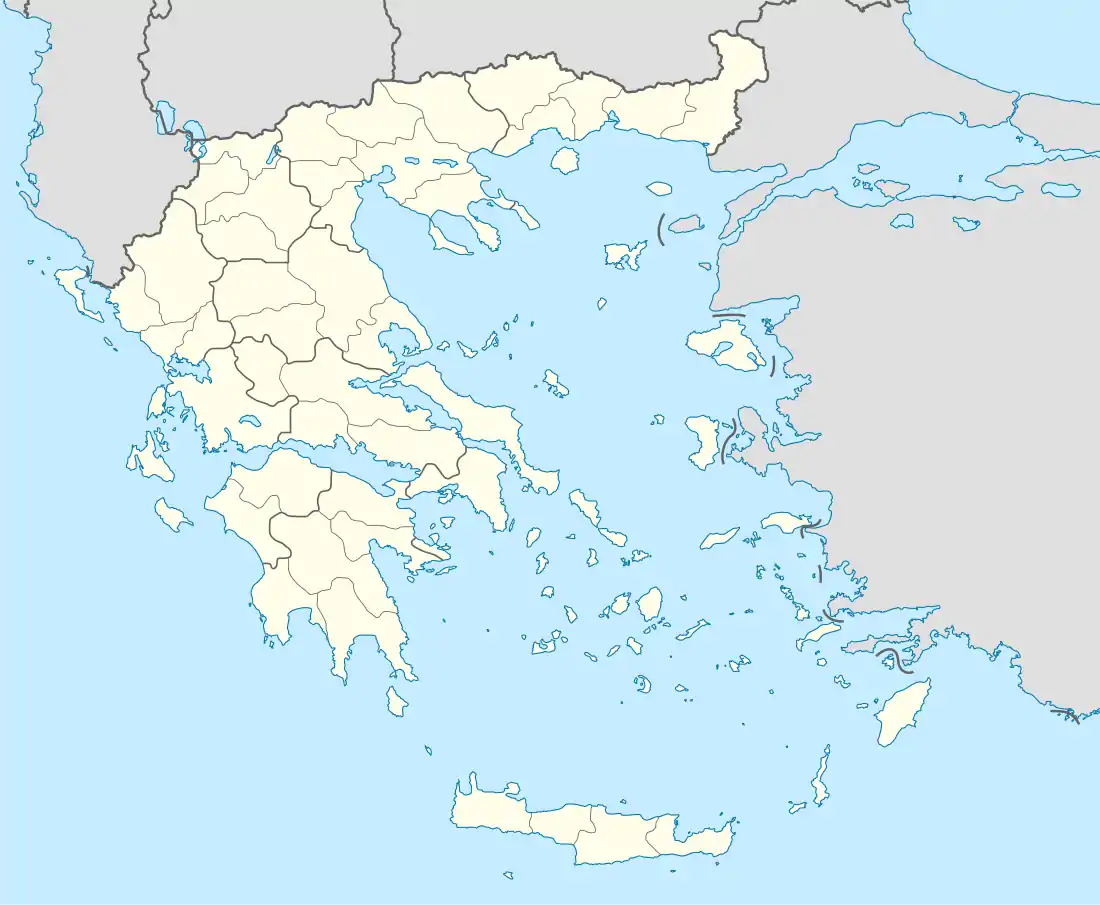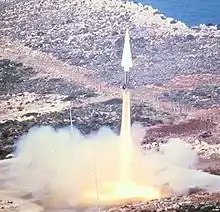Crete Naval Base
Crete Naval Base (Greek: Ναύσταθμος Κρήτης, Nafstathmos Kritis) is a major naval base of the Hellenic Navy and NATO at Souda Bay in Crete, Greece.
| Crete Naval Base Ναύσταθμος Κρήτης | |
|---|---|
| Souda Bay, Crete, Greece | |
_arrives_for_a_logistics_stop_on_the_Greek_island_of_Crete.jpg.webp) The Nimitz-class aircraft carrier USS Theodore Roosevelt (CVN-71) arrives at Souda Bay, Greece. | |
 Logo of the Hellenic Navy's Crete Naval Base | |
 Crete NB Location of Crete Naval Base, Greece | |
| Coordinates | 35°29′46.5″N 24°08′51.5″E |
| Site information | |
| Owner | |
| Controlled by | Allied Maritime Command (NATO) |
| Site history | |
| Built | 1951 |
| Built by | Greek Government |
| In use | 1951 – present |
| Garrison information | |
| Current commander | Commodore Dimosthenis Helmis |
| Garrison | 2nd Branch - DDΜΝ - Hellenic Navy General Staff |
Formally known in NATO as Naval Support Activity, Souda Bay (NSA-Souda Bay),[1] and more commonly in Greece as the Souda Naval Base (Greek: Ναυτική Βάση Σούδας, Naftiki Vasi Soudas), it serves as the second largest (in numbers of warships harboured) naval base of the Hellenic Navy and the largest and most prominent naval base for the United States and NATO in the eastern Mediterranean Sea.[2][3][4][5] Additionally, it features the only deep water port in Southern Europe and the Mediterranean Sea that is suitable and capable of maintaining the largest aircraft carriers (class "supercarriers"). The only other such options available for the US Navy are Norfolk Naval Station and the Puget Sound Naval Shipyard in the United States and Dubai in the Persian Gulf.[6]
History
Souda is a naturally protected harbor on the northwest coast of the island of Crete, founded for the first time during the Ottoman period, in 1872.
During World War II and the Battle of Greece, the harbor was the target of an Italian raid against the Allied navy as part of the Mediterranean Campaign.
After the war, the naval base was founded, around the same period with Greece's entry into the North Atlantic Alliance.
Facilities
The Naval Base of Souda Bay occupies an area of 500 hectares, including the old artillery barracks of Army's 5th Infantry Division and later land acquisitions. The facilities include a dry dock, workshops, a fuel depot and an ammunition depot. The Naval Station is commanded by a Commodore or Captain of the Hellenic Navy. The Forward Logistics Site Souda Bay (FLS Souda Bay) was under the operational control of NATO's Allied Naval Forces Southern Europe (COMNAVSOUTH), until 2013. Since then, it is under the control of the Allied Maritime Command (MARCOM) which replaced NAVSOUTH. The Hellenic Navy radio communications station SXH is also located since 1929 at Mournies, near Souda.[7] The Κ-14, a deep-water quay, is the only of its kind in the Mediterranean Sea that allows the aircraft carriers to dock.
Since 2007, the Souda Bay naval base is host of the NATO Maritime Interdiction Operational Training Centre (ΝMIOTC), which is located at the Northern Sector of the base (Marathi).[8]
Gallery
_departing_Greece.jpg.webp) The American aircraft carrier USS Harry S. Truman (CVN-75) sails out of the Souda Bay harbor in Crete, Greece, following a four-day port visit to Greece's largest island.
The American aircraft carrier USS Harry S. Truman (CVN-75) sails out of the Souda Bay harbor in Crete, Greece, following a four-day port visit to Greece's largest island. Greek line handlers assist as Arleigh Burke-class guided-missile destroyer USS Forrest Sherman (DDG-98) arrives in Greece for the first port visit of her maiden deployment.
Greek line handlers assist as Arleigh Burke-class guided-missile destroyer USS Forrest Sherman (DDG-98) arrives in Greece for the first port visit of her maiden deployment._arrives_for_a_port_visit.jpg.webp) The Naval Support Activity Souda Bay's Security Department soldiers stand a security watch in front of the French aircraft carrier FS Charles DeGaulle (R 91) as it docks at the Marathi NATO pier facility in Souda Bay.
The Naval Support Activity Souda Bay's Security Department soldiers stand a security watch in front of the French aircraft carrier FS Charles DeGaulle (R 91) as it docks at the Marathi NATO pier facility in Souda Bay._at_the_NATO_Maritime_Interdiction_Operational_120512-N-FV216-014.jpg.webp) A Hellenic navy special operations forces instructor, right, conducts small arms training with U.S. Sailors aboard the Hellenic navy training ship Aris (A-74) at the NATO Maritime Interdiction Operational Training Centre in Souda Bay, Crete
A Hellenic navy special operations forces instructor, right, conducts small arms training with U.S. Sailors aboard the Hellenic navy training ship Aris (A-74) at the NATO Maritime Interdiction Operational Training Centre in Souda Bay, Crete Sailors conduct mooring operations as the fast-attack submarine USS Albany (SSN-753) arrives in Souda Bay for a routine port visit.
Sailors conduct mooring operations as the fast-attack submarine USS Albany (SSN-753) arrives in Souda Bay for a routine port visit..jpg.webp) Greek Navy Warrant Officer Alexander Tsaltas demonstrates tactical sweep techniques for U.S. Marines with the 26th Marine Expeditionary Unit's maritime interception operations assault force aboard the training ship HNS Aris in Souda Bay, Crete, Greece
Greek Navy Warrant Officer Alexander Tsaltas demonstrates tactical sweep techniques for U.S. Marines with the 26th Marine Expeditionary Unit's maritime interception operations assault force aboard the training ship HNS Aris in Souda Bay, Crete, Greece A U.S. Navy and Hellenic Navy in training exercise at the NATO Maritime Interdiction Operational Training Center in Souda Bay, Crete, May 12, 2012, during Phoenix Express 2012, a two-week exercise and cooperation among partners from Africa, Europe and United States.
A U.S. Navy and Hellenic Navy in training exercise at the NATO Maritime Interdiction Operational Training Center in Souda Bay, Crete, May 12, 2012, during Phoenix Express 2012, a two-week exercise and cooperation among partners from Africa, Europe and United States..jpg.webp) A U.S. Air Force F-16 Fighting Falcon aircraft pilot taxis to the flight line in Souda Bay, Greece, Aug. 18, 2014, during a training event between Greece and the United States.
A U.S. Air Force F-16 Fighting Falcon aircraft pilot taxis to the flight line in Souda Bay, Greece, Aug. 18, 2014, during a training event between Greece and the United States. A Qatar Emiri Air Force Dassault Mirage 2000-5 fighter jet takes off as part of a Joint Task Force Odyssey Dawn mission, at Souda Bay.
A Qatar Emiri Air Force Dassault Mirage 2000-5 fighter jet takes off as part of a Joint Task Force Odyssey Dawn mission, at Souda Bay. Nike-Hercules firing at NAMFI by 220 Squadron RNLAF, from Souda Bay, Greece
Nike-Hercules firing at NAMFI by 220 Squadron RNLAF, from Souda Bay, Greece The Royal Navy during World War II, harboured in Souda Bay.
The Royal Navy during World War II, harboured in Souda Bay.
References
- "NSA Souda Bay". cnic.navy.mil. Retrieved 30 December 2017.
- "Cementing a long-term deal with Greece: Souda Bay gives the U.S. a singulary valuable port in the Eastern Mediterranean". Washington Times. Retrieved 7 June 2017.
- "Souda Bay US Naval Base 'best in the Med'". Daily Hellas. Retrieved 27 March 2017.
- "Souda Bay Base Anchors NATO Role In Eastern Med". realcleardefense.com. Retrieved 27 March 2017.
- "The Expanding Strategic Significance of Souda Bay" (PDF). ahiworld.org. Archived from the original (PDF) on 28 March 2017. Retrieved 27 March 2017.
- "Speeches and Interviews by Ambassador Geoffrey R. Pyatt". US Embassy at Athens. Retrieved 3 May 2017.
- Kevin Nice (2003). Ferrell's Confidential Frequency List (13th Edition). PW Publishing Ltd. p. 535. ISBN 1-874110-35-2.
- "Nato Maritime Interdiction Operational Training Centre". Archived from the original on 16 June 2009. Retrieved 12 September 2010. (in English and Greek)
External links
- "Crete Naval Station" (in Greek). Hellenic Navy. Archived from the original on 2008-04-12. Retrieved 2008-04-26.
- "US Naval Support Activity Souda Bay (Official web site)". Retrieved 2010-09-28.
- "US Naval Support Activity Souda Bay". Global Security web site. Retrieved 2008-02-16.
- NATO Maritime Interdiction Operational Training Centre
- U.S. Naval Support Activity Souda Bay Official's photostream